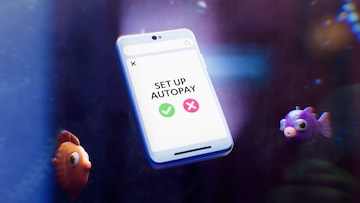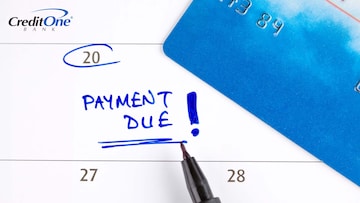4 Tips on Managing Your Credit Account
July 24, 2025
Getting a credit card is just step one. Here’s how to get the most out of your account while building credit at the same time.

Introduction
So you have a new credit card. Congratulations! Now, how are you going to handle the care and feeding of this new addition to your financial family?
Properly managing your credit card account helps you keep your money safe, take advantage of all your benefits, maximize your rewards, and even build your credit. It also makes it easier to avoid potentially expensive pitfalls like credit card late fees or fraud.
Let’s look at four essential tips to help you master credit card management and improve your financial literacy.
Monitor Your Account Regularly
The first rule for managing your account and keeping it safe is to not talk about it. Oh, wait, that’s for secret clubs. Well, it’s actually somewhat true here too, but even more important is to pay attention to it.
A simple review of your account on a regular basis will let you know how much you’ve spent in the current billing cycle, and potentially alert you to any fraudulent activity. This won’t just help you manage your credit card account — it will also help you manage your finances in general.
Monitoring is easier than you might think. Most credit cards come with a mobile app so you can check your account whenever you like — right from the palm of your hand. Log in while waiting in line for your coffee before work, between the innings of your son’s baseball game, or when you’re stuck in the doctor’s lobby without any new magazines to read. You can also bookmark the website for quick access on your computer at home.
Make a commitment to yourself to check your card account every day, whether it’s before you start browsing Facebook or when you sit down to watch the evening news. The sooner you catch something unusual, the easier it is to fix it.
You can also use free budgeting apps to see how your spending aligns with your budget. A quick glance will show whether you’ve already spent your restaurant allocation for the month, which means you should stay in for dinner tonight rather than eating out.
While we’re at it, staying on top of your points or cash back rewards is an often-overlooked aspect of managing your account. Keeping track of what you’ve earned will help make sure you redeem your points on time (if they expire) and get the maximum reward level possible if your card has tiers, rotating spending categories, or promotional bonus rewards.
Pay on Time Every Time
Making regular, timely credit card payments is the best thing you can do for your financial life, because it’s the factor with the biggest impact on your credit score.
A history of on-time payments makes a solid foundation for a high credit score. One of the best ways to guarantee you never miss a credit card due date is to set up automatic payments. You can either use bill pay through your bank account or AutoPay through your credit card account. The latter is the easiest and most flexible because you can choose to pay your minimum due, full balance, or another pre-determined amount.
Bill pay through your bank will typically take a few days longer since it either goes through an electronic ACH payment or sends a paper check through the mail. Either method takes at least 1-3 business days for payment to arrive, but you should plan on a week’s buffer to be safe. And you also may need to manually adjust the amount to match what you owe each month — or stick with a round number that’s always more than your minimum due, like $50 or $100.
Once you’ve covered at least your minimum automatically, which prevents any late payment fees, you can still make additional payments to lower your balance. Just be aware that some credit card issuers place caps on the number of payments you can make each month. So if you’re planning to make small payments every week, you’ll need to make sure it’s possible first.
Prevent Credit Card Fraud
This one isn’t totally under your control, because it’s not like scammers and fraudsters will ask your permission to take advantage of you. But you can put some strong safeguards in place to prevent credit card fraud. And if you still get hit, acting quickly can help you do damage control.
Start by using unique secure passwords on every account you own, and turning on multifactor authentication (MFA). That might send you a text message or email with a temporary verification code, or require confirmation through an authenticator app. This added layer of security makes it extremely difficult for anyone to log in as you and take over your account.
Next, set up account notifications and alerts for unusual activity. These will ping you if an oddly large transaction takes place, or a purchase is made from a different location. You usually have access to a range of alert options through your credit card mobile app or online account.
So, what happens if you see an unexpected charge come through on your account? Call your credit card company immediately to verify and dispute the charges. If it was credit card theft or fraud, your card company will likely cancel your card for you and issue a new one with a different account number.
It’s also a good idea to monitor your other accounts in case more of your financial information was compromised. Then follow up by checking your credit reports from all three credit bureaus so you can make sure that no new accounts were opened under your name. You can get your reports for free at AnnualCreditReport.com (every week now, despite the site name).
Practice Credit-Building Strategies
And finally, as you increase your account management skills, you can also start using your card to build credit. You could save money in the short term by optimizing your spending and payment habits, and enjoy the long-term benefits of having a good credit score.
Maintaining a healthy credit utilization ratio — which is the amount of available credit you’re currently using — is one of the keys to improving your credit score. You’ll typically boost your score over time by keeping your balance below 30% of your limit.
Paying your bills on time not only prevents having to deal with late fees and other penalties. It also increases your credit score by establishing a positive payment history.
Paying more than your minimum due each month will reduce what you pay in interest. In fact, always paying off the full balance during your grace period can help you avoid interest charges altogether
Keeping your credit card open and active, even when you think you’re not going to use it, can help improve your credit score by having a longer credit history on the books.
Diversifying your credit mix by getting a credit card in addition to a loan shows lenders that you can manage different types of credit effectively.
Bottom Line
Actively managing your credit card account can lead to simplified finances, better opportunities, improved credit, and more peace of mind. And you don’t have to do all the work yourself, because account automation gives you some set-it-and-forget-it options to save time and energy.
If you have a Credit One Bank card, you can manage your account by securely logging in through the website homepage. Or download the mobile app for on-the-go access anytime, anywhere.




